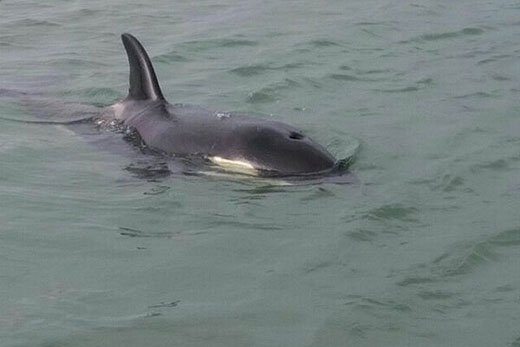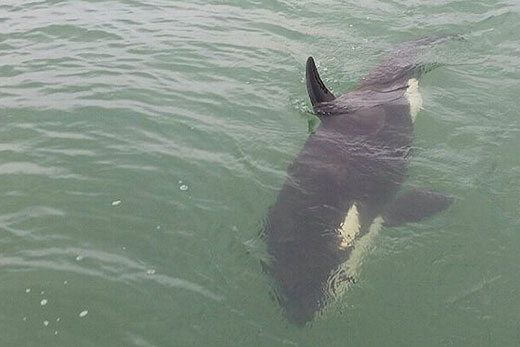The team of experts working to save a young male orca, which has been alone for around a week, are out on the water again this morning.
Founder of the Orca Research Trust Dr Ingrid Visser says the hope is to get the young calf back with his family as soon as possible.
Attempts are continuing today to help this young male orca. Photos: Orca Research Trust.
Conditions this morning are fine and calm, in contrast to the wind, rain and hail of recent days, making it more pleasant for the rescue team and the young mammal, believed to be between seven and 12-months-old.
Among those helping the calf are international orca expert Jeff Foster from America who has experience in helping a wild orca calf.
He led the capture of Springer the orca, who was separated from her pod as a calf, and later returned her back to her pod. He also worked to prepare the killer whale Keiko, from the 1993 movie Free Willy, for release into the wild.
In an effort to find the young orca's family pod, recreational and commercial boat operators are being asked via the coastguard's marine radio to report sightings of orca pods in the Bay of Plenty region to the Orca Research Trust by phoning: O800 SEE ORCA / 0800 733 6722.

Yesterday DNA samples taken from the calf were sent to lab for testing in an effort to establish which pod he belongs to. Ingrid and Jeff also took a sample from the orca's breath by holding a plastic disk with an agar solution, above the animal's blow hole.
The agar captures particles in the orca's breath.
The decision to enlist the coastguard's support was made by the Orca Tactical Planning Group made up of members from a broad range of disciplines, backgrounds and cultures.
They have diverse skills, and are working together to achieve the best possible result for the whale.
'We're really grateful to Tauranga Coastguard for helping the OTPG with one of our goals - seeing if we can find this lone orca calf's family pod,” says DOC Orca Incident Controller John Lucas.
'This group is in agreement that reuniting the lone orca calf with its family pod is the key to its long term survival in the wild.
'The difficulty we all face is finding the young orca's family pod as there have been no indications where the calf has come from,” says John.



7 comments
Hmmmm
Posted on 02-08-2016 11:59 | By How about this view!
There will no doubt be those that believe in this operation, but once again it is just a fact that this sort of thing happens. We should be taking a step back and considering if it is truly worthy to interfere with the course of nature or are we simply prolonging a death into a long and painful existence? Death happens! and at the end of the day there are countless other organisms that benefit and thrive from the clean-up of the remains. Strandings etc have been a part of our environment for millennia and it is only recently (Possibly due to the development of the telephone) that we have been rushing to extend the deaths of the animals. Is that worthy?
We all pay
Posted on 02-08-2016 15:15 | By maildrop
This is costing a fortune and it straight out of our pockets. And why? It's nature, we shouldn't interfere and it's highly unlikely to succeed. It's just pampering to left wing loonies who think money grows on trees.
Ridiculous
Posted on 02-08-2016 16:08 | By Captain Sensible
This is getting ridiculous. Let nature take it's course. It's not like Orcas are endangered. Have these do-gooder "experts" got nothing better to do than spend somebody elses money?
I agree...
Posted on 02-08-2016 20:20 | By GreertonBoy
With the previous comments. We don't live in a perfect world according to we humans... but nature itself would be perfect (for nature) if humans stopped interfering. It would be so nice to save every creature from natures wrath, but the calf may have been cast off by the pod if it is deemed by the pod to be nhealthy'? If you take it back to the pod, the pod may kill it? What proof is there that it is in distress? Maybe it has left the pod to find other stragglers to form a new pod? Maybe that is what nature intends? I find your intentions are very admirable... but really, there are people that need help that the dna resources,the time/money and team members would probably be of more benefit? Save beached ones if you can, not just lost ones imo
For all of the know it all's
Posted on 02-08-2016 22:02 | By awaroa
The nz population of orca is less than 200. That's less than the population of kiwi, kokako, tuatara which are all on the endangered species list. Dr Visser gives the proof about the animal being in distress. I support letting nature take its course but you lot are painful with your superior than most attitudes.
Good job
Posted on 03-08-2016 08:22 | By Wonkytonk
Whats wrong with these people commenting. They have not been asked to be out their, leave these experts alone. They doing more help than harm.
What if...
Posted on 05-08-2016 11:08 | By GreertonBoy
the experts get the little fella better and somehow get him back to his pod...which is costing all of us money and tying up dna labs and other departments time.... and the pod bites his head off because the pod rejected him? Now he is out of the ocean and in a pool, if his parent or pod are looking for him, how can they possibly find him now? I say again, humans insist on tinkering with nature. We cant see any psychological flaws in him, but maybe the pod has. And how does anyone know there is only 200 orca in our waters? they move in and out of our waters. It is very noble the experts are interfering, but I still think their time and effort would be better spent elsewhere on this particular occasion.
Leave a Comment
You must be logged in to make a comment.